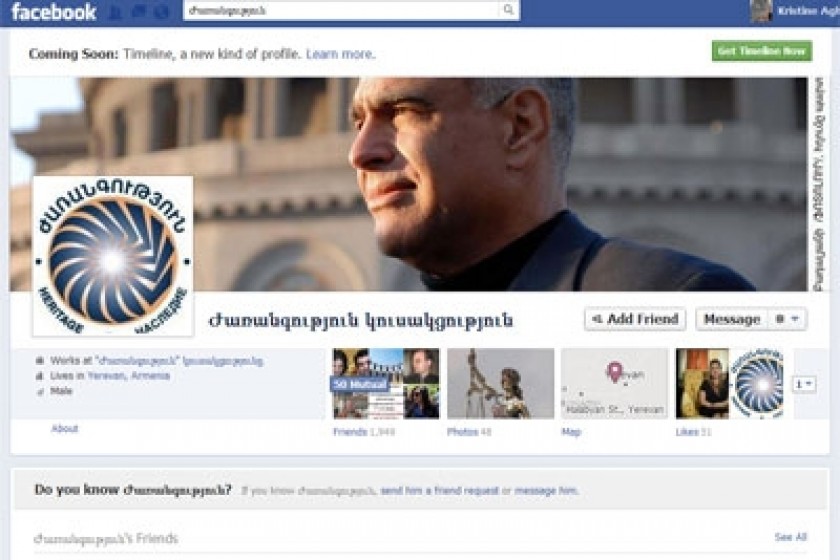
The “Virtual” Face of Election Campaigning
Seven of the nine political forces contesting the elections had web sites that were updated during the campaign drive, mostly in terms of design and, to a much lesser extent, in content.
Only a few of these sites were actually used for campaigning purposes. In this respect, the sites of the Heritage Party and the HAK (ANC) coalition stand out. Prospective voters could get an overall picture of their platforms, their candidates, and the general election process.
Prosperous Armenia (BHK) and Country of Law (OYK) partially used this resource, merely downloading the most basic attributes linked to the campaign. Despite the ARF’s far-reaching and very effective campaign, this party’s site almost never reflected all this. In the utilization of the internet, the ARF was quite conservative in its approach.
The same can be said for the Republican Party of Armenia (HHK). This party stands out for using its website for hidden propaganda. Not only was party news downloaded in the site, but it also incomprehensibly served as a news outlet for the president and the prime minister. This approach was at the core of the HHK’s campaign structure and methodology.
In the main, however, the websites of the political parties didn’t present much of interest to those who visited them. Much more of interest was to be found in the social websites and various online forums. The problem was that visitors to these sites were the most politicized and publicly active segments of the society, people with firmly held views. Thus, from a practical standpoint, the political parties couldn’t really wage a campaign for hearts and minds in the social websites. This fact this explains their inaction in the internet media landscape.
Perhaps this is the reason why individual reps of the political forces, and not the parties themselves, used the internet and various social networks to present the public with an overall image of the parties, their activities and underlying motivations.
Thus, the more recognizable and influential these individuals were in terms of the internet landscape, the better the image for the party being represented. In this respect, Heritage and HAK were the ones who used the virtual communications resources most effectively. The large numbers of their supporters and Facebook followers, having certain commonalities of outlook and political perspective disagreements, occasionally were able to create interesting palettes with their targeted commentaries and sting critiques.
In contrast to the parties, candidates running on majoritarian ballots used the resources of the internet to a much wider extent, creating personal campaign pages in an attempt to shape their public images. Here, the web pages of Satik Seryanyan, Samvel Farmanyan, Vladimir Karapetyan, Gohar Veziryan, Vahan Karapetyan, Garegin Noushikyan and a few other candidates stand out from a PR perspective.
Those who understood the importance of employing alternative methods to get their message and information out to the public were the ones who most efficiently used the resources of the “virtual” media.
Notwithstanding, from a propaganda perspective, there were certain negative manifestations of the Armenian virtual reality. First, no political party or individual candidates were able to utilize the full mobilization potential afforded by the internet’s communication’s realm.
Communications did not exceed the simple level of information exchange – it did not lead to groupings sharing certain ideas or opinions. The need for such collective work on the part of average citizens was primarily felt in terms of fighting election fraud, particularly the inaccuracies in the voter rolls.
The anti-culture towards civilized discussion and debate in Armenian public-political relations was fully manifested in the internet as well and, in certain cases, reached extreme levels of crudeness.
Elements of intolerance, ad hominem attacks, use of vulgarity, are all characteristic of facebook reality and surfaced more strongly during this election campaign.
The possibilities of the virtual media are inexhaustible especially because the issue of information accountability isn’t deep-seated and the use of unidentified information sources can become a tool for provocative manipulations.
The article in Regnum regarding the meeting between Raffi Hovannisian and Khachatur Kokobelyan (leaders of the Heritage Party and Free Democrats respectively) and Turkish officials in Great Britain and the reaching of a separate agreement, is just one example.
The public didn’t swallow this only for the reason that it was quickly exposed as an intentional fraud. However, this information blitz could have recorded some success because the sensational news quickly began to spread via the social forums, by those accustomed to not verifying the news source itself.
This is a classic example of negative PR to blemish the leaders as well as the Heritage Party in general.
In this context, the internet served to refine negative manifestations characteristic of the Armenian press.
As regards the internet information-analytical websites, they basically were not different from the press in terms of the direction of their messages because, like the press, they mostly focused on intrigue and did not delve deeper into the underlying cause and effect links of on-going developments and processes.
 Videos
Videos Photos
Photos
Comments (1)
Write a comment